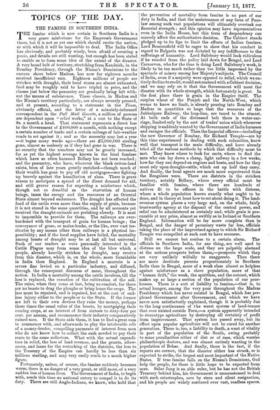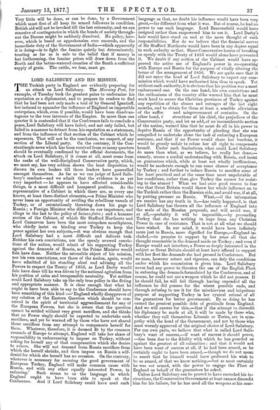TOPICS OF THE DAY.
THE FAMINE IN SOUTHERN INDIA.
THE famine which is now certain in Southern India is a very grave misfortune for the Empress's Government there, but it is not as yet one which should excite the nation,
or with which it will be impossible to deal. The India Office has obviously, and probably wisely, been afraid of creating a panic, and details are still wanting, but enough has been stated to enable us to form some idea of the extent of the disaster. A very broad belt of territory, stretching from Kandeish, in the
Bombay Presidency, through the Nizam's Dominions to the eastern shore below Madras, has now for eighteen months received insufficient rain. Eighteen millions of people are stricken with drought, their local stores are almost exhausted, food may be roughly said to have tripled in price, and the chases just below the peasantry are gradually being left with- out the means of subsistence. These classes, in Madras and the Nizam's territory particularly, are always severely pressed, and at present, according to a statement in the Times, obviously official, and the letter of a minutely-informed correspondent in the Pall Mall Gazette, a million of persons are dependent upon " relief works," at a cost to the State of 8s. a month a head. That statement represents a direct loss to the Government of £400,000 a month, with nothing except a certain number of tanks and a certain mileage of fair-weather roads to set against it ; and as the necessity may last a year —it began many weeks ago—there are £5,000,000 sterling gone, almost as uselessly as if they had gone in war. There is no security that the numbers may not be greatly increased, for as yet the highest average known in the local famines which have so often harassed Bellary has not been reached ; and the peasantry, who have, wherever the black cotton-land exists, been of late years greatly enriched—though much of their wealth has gone to pay off old mortgages—are fighting up bravely against the humiliation of alms. There is grave reason to anticipate a spread of the direct demand for aid, and still graver reason for expecting a misfortune which, though not so dreadful as the starvation of human beings, taxes the energy and the resources of an Oriental State almost beyond endurance. The drought has affected the food of the cattle even more than the supply of grain, because it is not stored in the same quantities, and by all accounts yet received the draught-animals are perishing already. It is next to impossible to provide for them. The railways are over- burdened with the transport of grain for human beings ; the conveyance of grass, or maize-husks, or the like, over vast ter- ritories by any means other than railways is a physical im- possibility; and if the local supplies have failed, the mortality among beasts of draught may be at last all but universal. Such of our readers as were personally interested in the Cattle Plague may form some idea of the blow which a people, already heavily stricken by drought, may receive from this disaster, which is, on the whole, more formidable in India than England. In England a murrain is a severe fine levied on a particular industry, and diffused, through the consequent dearness of meat, throughout the nation. In India a mortality among the cattle involves, till the loss is replaced, the cessation of the cultivation of the soil. The rains, when they come at last, bring no comfort, for there are no beasts to drag the ploughs or bring home the crops. The loss must be repaired, and is repaired, but at the cost of end- less injury either to the people or to the State. If the former are left to their own devices they raise the money, perhaps three times the usual value of the beasts, by mortgaging their coming crops, at an interest of from sixteen to sixty-four per cent. per annum, and recommence their industry comparatively ruined men. If the State aids them, it has to find a great sum to commence with, and afterwards to play the intolerable role of a money-lender, compelling payments of interest from men who do not know how to collect the cash needed to pay their rents to the same collectors. What with the actual expendi- ture in relief, the loss of land revenue, and the grants, allow- ances, and loans for the restocking of the districts, the loss to the Treasury of the Empire can hardly be less than six millions sterling, and may very easily reach to a much higher figure.
Fortunately, unless, of course, the famine suddenly becomes worse, there is no danger of a very great, or still more, of a very sudden loss of human lives. The Government of India, to begin with, needs this time no national outcry to compel it to do its duty. There are still Anglo-Indians, we know, who hold that the prevention of mortality from famine is no part of our duty in India, and that the maintenance of any form of Poor- law among such vast populations will ultimately overtask our financial strength ; and this opinion may have representatives even in the India House, but this form of despondency can scarcely affect the authoritative decision. The Cabinet stands pledged up to its lips to limit the effects of Indian famines. Lord Beaconsfield will be eager to show that his conduct in regard to Bulgaria was not dictated by any indifference to the sufferings of humanity. Lord Salisbury would look ridiculous if he receded from the policy laid down for Bengal, and Lord Carnarvon, who for the time is doing Lord Salisbury's work, is likely to be too much rather than too little impressed by the spectacle of misery among her Majesty's subjects. The Council of India, even if a majority were opposed to relief, which we en- tirely decline to credit, would not contend with a Cabinet decision, and we may rely on it that the Government will meet the disaster with its whole strength, which fortunately is great. In the first place there is grain in the Empire itself. The surplus wheat of the Punjab and the North-West, which seems to know no limit, is already pouring into Bombay and Madras in quantities so large that the resources of the Jubbulpore Railway, the loop-line, are taxed to the utmost.
At both ends of the distressed belt there is water-car- riage, limited only by the sort of trades' union which whenever shipping is suddenly wanted by the Government of India harasses and enrages the officials. Then the Imperial officers—including the new Governor of Bombay, Sir Richard Temple—are by this time experienced in dealing with such calamities, know well that transport is the main difficulty, and have already tried all the various methods by which that difficulty must be met. They know where to look for carts, where to find the men who can lay down a cheap, light railway in a few weeks, how far they can depend on engines and boats, and how far they must rely upon draught-cattle, which eat up half they carry. And finally, the local agents are much more experienced than the Bengalees were. There are districts in the stricken territory, notably Bellary, where every official must be familiar with famine, where there are hundreds of natives fit to be officers in the battle with distress, where a whole population knows exactly what ought to be done, and in theory at least how to set about doing it. The land- revenue system places a very large and, on the whole, fairly trustworthy agency at the disposal of the central power, and relief can be administered as certainly and, while grain is pro- curable at any price, almost as swiftly as in Ireland or Southern England. Information will be far more complete than in Bengal, and the danger of pecuniary waste far less, officials taking the place of the improvised agency to which Sir Richard Temple was compelled at such cost to have recourse.
Still we cannot but confess to a certain alarm. The officials in Southern India, for one thing, are well used to distress on the large scale, and they are palpably alarmed at the serious prospects before them,—prospects which they are very unlikely wilfully to exaggerate. Then there are more destitute persons proportionately in Southern India than in Bengal, more of a weak class almost as helpless against misfortune as a slave population, more of that " human drift," the weak, the spiritless, and the outcast, which makes up so large a section of the population of our poor- houses. There is a sort of liability to famine,—that is, to actual hunger, among the very poor throughout the Madras Presidency which has never existed in Bengal, which has per- plexed Government after Government, and which we have never seen satisfactorily explained, though it is probably due to the long continuance of the worst system of land-tenure that ever existed outside Peru,—a system apparently intended to stereotype agriculture by destroying all certainty of profit from improvement. That system has passed away, but its
effect upon popular agriculture will not be cured for another generation. There is, too, a liability to death, a want of vitality in part of the population of the South, owing probably to some peculiarities either of diet or of race, which worries philanthropic doctors, and was almost entirely wanting in the population of Behar. And finally, there is the fact, if the reports are correct, that the disaster either has struck, or is expected to strike, the largest and most important of the Native
States. If true famine falls on the Nizam's Dominions, God help the people, for there is little hope to be expected from man. Salar Jung is an able ruler, but he has not the British Treasury behind him, his Government is unaccustomed to deal with such catastrophes, save by stern and silent resignation, and his people are widely scattered over vast, roadless spaces. Very little will be done, or can be done, by a Government which must first of all keep its armed followers in condition. British aid will not be invoked till the last extremity, and we can conceive of contingencies in which the bonds of society through.. out the Deccan might be suddenly dissolved. No policy, how- ever, which is based on apprehension ever succeeds, and the immediate duty of the Government of India—which apparently it is doing—is to fight the famine quietly bui determinately, trusting as far as is safe to thd belief that if money is but forthcoming, the famine prices will draw down from the North and the better-watered counties of the South a sufficient supply of grain. The cattle, we fear, must go.







































 Previous page
Previous page